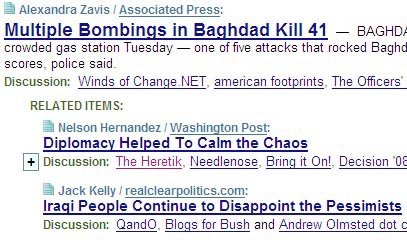Michael A. Fletcher writes in today’s Washington Post,
President Bush plans to begin a series of speeches next week again explaining the administration’s strategy for winning the war in Iraq, as the White House returns to a familiar tactic to allay growing public pessimism about the war that has helped keep the president’s approval rating near its historic low.
After previewing the upcoming speech in his radio address today, the president is scheduled to make remarks on the war at George Washington University on Monday. The appearance, which will be followed weekly by as many as four other speeches, marks the start of the White House’s latest effort to convince skeptical Americans that it has a coherent plan for victory as the war nears its third anniversary later this month.
Um, didn’t we do this before? Listen to Bush give a series of four speeches to explain the administration’s strategy for winning the war in Iraq? Like, less than four months ago? Yeah, let’s see — I live blogged the first one, and provided more commentary here, here, here, here, and probably some more places.
Does he have some new strategies, or can I just re-run the old posts? I guess we’ll find out. And why four more speeches?
President Bush claims to not be concerned about dismal poll numbers, but the White House is feeling intense concern.
The public relations offensive is being launched amid intense concern in the White House about polls showing that a growing majority of Americans disapprove of Bush’s handling of the war and harbor growing doubts about the prospects for success. A recent Washington Post-ABC News poll found that four in five Americans believe that the ongoing sectarian violence in Iraq will mushroom into civil war. Also, more than half of those surveyed believe the United States should begin withdrawing troops from Iraq, the poll found.
Meanwhile, the president’s approval rating remains at 41 percent, virtually unchanged since January and among the lowest in his presidency.
Seriously, what do the Bushies hope to accomplish by making speeches? For that matter, what do they hope to accomplish by running Dubya around New Orleans wearing a bleeping toolbelt?
Fact is, there is something that could make a difference; something that Bush could do that might turn the bad numbers around and send them going up again.
He has to bleeping accomplish something.
It doesn’t even have to be a finished accomplishment. It can be an accomplishment in progress, but it has to be something that is undeniably actually happening. Talk and trick photography ain’t cuttin’ it no more.
For example, nobody expects New Orleans to be rebuilt in only six months. But by now we should see a coherent plan of action underway, and we should have a sense that somebody is in charge who knows what he or she is doing.
Without that, it doesn’t much matter how many times the President gets his picture taken with his sleeves rolled up. Nobody’s buying it.
Now we’re approaching the third anniversary of the invasion of Iraq. And it doesn’t matter how many five-star generals the Bushies trot in front of a camera to say that everything’s fine. Only those with a gallon-a-day Kool-Aid habit haven’t noticed the situation in Iraq is becoming more unstable every day.
If the reverse were true, and Iraq were becoming measurably more stable, and U.S. troops withdrawals were around the corner, Bush wouldn’t need to make speeches. But without visible improvement in the situation in Iraq, all the speeches in the world won’t make any difference.
The Bushies don’t get this. In this post from December 12 I quoted a Time magazine story by Karen Tumulty and Mike Allen — no longer free content —
The plan is to make January a critical month in what the President’s aides hope will be a turning-point year. The White House expects a quick victory on Bush’s Supreme Court nominee Samuel Alito, and the State of the Union speech will nod to big goals. But when it comes to fresh and concrete ideas, the list of what Bush will actually try to accomplish in 2006 is so modest that one bewildered Republican adviser calls it “an insult to incrementalism.â€
Iraq is hemorrhaging, New Orleans is moldering, and the Bushies can’t think of anything in particular that needs to be accomplished. Excuse me while I go bang my head on the floor and howl.
On the bright side — considering that Bush’s approval numbers dropped after the last four speeches, another four should pretty much finish him off. Bring it on …

